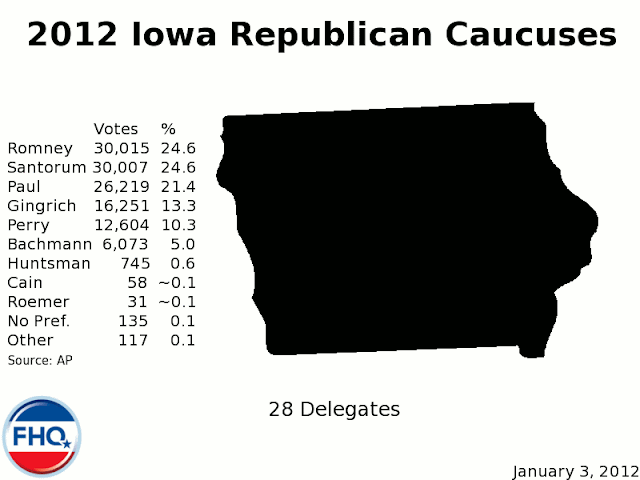Now, FHQ makes no bones about it: We are no fans of the Associated Press delegate projection. Yeah, that's right. I said it. The AP has a projection of delegates; not a count. The distinction is important if we are to accurately count the number of delegates allocated to each candidate. What the AP is doing is taking delegates bound to candidates (but not, truth be told, actually allocated yet) by the primaries and a handful of binding caucuses thus far and adding on top of that total a fantasy proportional allocation of delegates in the non-binding caucus states.1
But enough AP bashing.
You will also notice that FHQ has yet to update its delegate count to include the numbers from Super Tuesday. That is equal parts slow wading through the results and waiting on the RNC delegate count which FHQ uses as a kind of baseline check on our count. Now that the RNC count is out though, I take issue with some of their count based on the numbers I have. Overall they have:
Romney: 339But the issues:
Gingrich: 107
Santorum: 95
Paul: 22
- No one -- or very few anyway -- have access to the Tennessee numbers; particularly the results by congressional district. The Tennessee secretary of state did not tabulate the vote by congressional districts. Well, they tabulated the delegate elections by congressional districts but not the topline presidential preference vote. It was the Tennessee Republican Party that did that tabulation, and they aren't releasing the numbers until the vote is certified or close to certified. TNGOP asked me to call back on Monday or Tuesday to check on their progress. [Note to self: Be more persistent next time. And hey, don't they know who I am? That ridiculously nitpicky delegate counter.] So we are all kind of taking AP's or the RNC's word on this one. And yes, FHQ is fully aware of the fact that the TNGOP is way more likely to share their results with the national party than FHQ. The Tennessee results are a minor point but still worth noting.
- There is a discrepancy between the RNC count of the county delegates allocated thus far in Wyoming and what is being reported in the Equality state. The RNC says Romney has won three delegates, Paul one and that one other delegate will head to the convention uncommitted. But six counties have elected delegates thus far and as the Casper Star-Tribune reports Romney has received four with Paul at one and the remaining delegate uncommitted.2
- Finally, FHQ has done the math at least three times now for Georgia based on the results currently being reported by the secretary of state's office in the Peach state. FHQ has Gingrich with 47% of the vote pulling in 20 of the proportionally allocated 31 at-large delegates and Romney with the remaining 11 as the only other candidate over the 20% threshold to receive delegates. Gingrich by virtue of his statewide win is also entitled to the three Georgia automatic delegates. In the congressional count, Gingrich won 12 of the 14 districts (5 of them with a majority of the vote). That nets Gingrich 31 of the 42 district delegates. Romney won the two remaining congressional districts (but not with a majority) and placed second (worth one delegate) in four other districts. Santorum placed second in three districts which would have gotten him three delegates.
If you have been adding these up that yields:
Gingrich: 54
Romney: 19
Santorum: 3
But the RNC has the count at:
Gingrich: 52
Romney: 21
Santorum: 3
It is worth pointing out that while the Georgia secretary of state is reporting all of the precincts in, only 99% of the votes are in. Now that is likely provisional ballots that are still outstanding. FHQ has no indication of how many of those votes are out. But the thing is that nothing in the reported results indicates that Gingrich and Romney are all that close in a district or statewide to warrant a two delegate swing anywhere. It is curious.
All told, FHQ now has problems with the AP projection and the RNC count. Again, the RNC has the preferred method in our neck of the woods, but they seem to be off a little -- at least based on the information FHQ has access to. Pushing aside the Tennessee issue -- until the count can be adequately dealt with -- the RNC count would need to be adjusted:
Romney: 339 (+1 Wyoming, -2 Georgia) = 338
Gingrich: 107 (+2 Georgia) = 109
Santorum: 95
Paul: 22
I know what you're saying. C'mon FHQ! We're talking about three delegates here. True, but if we're all going to attempt to be accurate with this, then we need to be accurate.
...not partially accurate.
--
1 And then there is the AP's contention that the Santorum win in Minnesota was enough to warrant a winner-take-all allocation of its 37 delegates. Don't get me started on the logic of that decision. Suffice it to say, there is nothing in Minnesota Republican Party rules that indicates any such allocation based on the precinct caucuses.
2 The remaining six county delegates will be chosen on March 10 in Wyoming.
2 The remaining six county delegates will be chosen on March 10 in Wyoming.
Recent Posts:
2012 Republican Delegate Allocation: Kansas
Romney Sweeps Northern Mariana Islands 9 Delegates
Guam Goes for Romney
Are you following FHQ on Twitter, Google+ and Facebook? Click on the links to join in.
2012 Republican Delegate Allocation: Kansas
Romney Sweeps Northern Mariana Islands 9 Delegates
Guam Goes for Romney
Are you following FHQ on Twitter, Google+ and Facebook? Click on the links to join in.



.png)






.png)

.png)
.gif)




